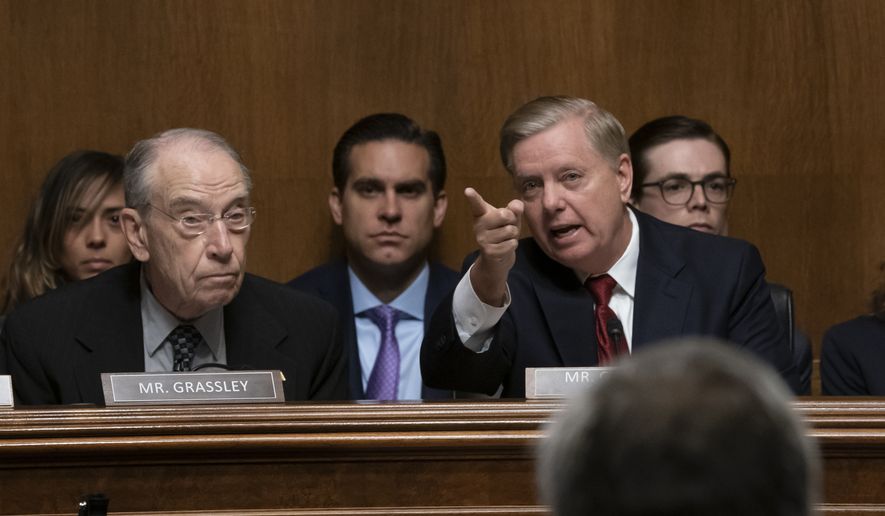Sen. Lindsey Graham is preparing to relinquish his chairmanship of the Judiciary Committee to Sen. Charles E. Grassley in the next Congress, beginning in 2021.
The South Carolina Republican’s staff confirmed Thursday that Mr. Graham would step aside, but he is poised to remain in the seat throughout the next year.
Mr. Graham has worked as chairman since the outset of 2019 to confirm President Trump’s federal judicial nominees, and he has been a vocal opponent of the House Democrats’ impeachment inquiry. Ahead of the House’s vote to formalize certain aspects of its impeachment inquiry on Thursday, Mr. Graham said last week that House Democrats’ effort was a “political lynching.”
The Senate is set to become the center of impeachment politics just as the 2020 campaign season ramps up next year if the House’s inquiry yields an impeachment trial in the Senate. Mr. Graham will remain chairman of the Judiciary Committee as he runs for reelection next year in South Carolina.
Mr. Graham told Politico on Thursday that Mr. Grassley asked to come back as chairman of the Judiciary Committee, which the Iowa Republican previously led from 2015 until earlier this year when Mr. Grassley took over the Senate Finance Committee.
Under Mr. Grassley’s chairmanship of the Judiciary Committee, the Senate confirmed two Supreme Court appointees selected by President Trump, Justices Neil M. Gorsuch and Brett M. Kavanaugh, against staunch partisan opposition.
Mr. Grassley processed Justice Gorsuch’s nomination amid a partisan filibuster, and Mr. Grassley worked to confirm Justice Kavanaugh amid last-minute allegations of sexual misconduct that arose as the committee was preparing to advance the nomination.
On Thursday, the Senate Judiciary Committee advanced a proposal from Mr. Graham and Sen. Kyrsten Sinema of Arizona to provide permanent additional security for U.S. Supreme Court justices. The legislation would permanently authorize the Supreme Court of the United States Police to protect the justices off the grounds of the court and it would allow the Supreme Court Police to protect justices domestically and internationally, as it is deemed necessary.
• Ryan Lovelace can be reached at rlovelace@washingtontimes.com.




Please read our comment policy before commenting.